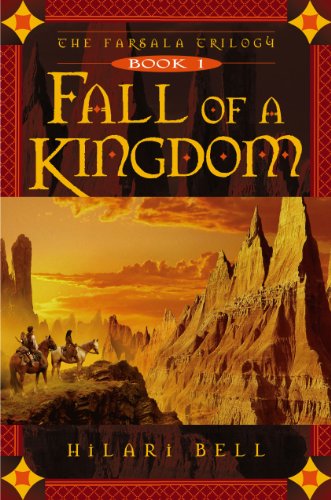
![]() Fall of a Kingdom by Hilari Bell
Fall of a Kingdom by Hilari Bell
Let the two of us end this war…
Fall of a Kingdomis the first book in the FARSALA trilogy, followed by Rise of a Hero and Forging the Sword, all set in a pseudo-Arabian land called Farsala which is attempting to resist the invasion of an ever-growing empire that bears more than a few similarities to the Roman Empire. Known as the Hrum, these invaders are committed to fighting any conquerable land for a year before negotiating for peace; knowing this, the armies of Farsala are determined to hold them off for the appointed amount of time and thus retain their independence.
The ensuing conflict is explored through the eyes of three very different protagonists, all of whom have opposing attitudes concerning the idea of the Hrum making Farsala a part of their empire. The first is Jiaan, the bastard son of a Farsalan commander, who longs only to make his father proud despite his illegitimacy. The second is Soraya, the same commander’s legitimate daughter, who is being sent away for her own safety whilst Farsala prepares for war. The third is Kavi, a peddler and con-artist that accidentally gets caught up in a Hrum patrol and agrees to become a spy for their cause, telling himself that they’ll punish the wealthy deghans that have made his life a misery.
Each character is beautifully portrayed and nicely developed throughout the book. Jiaan is acutely aware of his low status among the deghans as an unacknowledged son of a powerful man, something that drives him to excel in stressful situations, but it’s Soraya and Kavi that really make up the crux of the book. Due to political intrigue that demands that her father sacrifice her to appease the gods, Soraya is smuggled out to a farm on the borders of the country, where her spoilt nature is gradually eroded away as she gets to know the locals and their customs better; whilst Kavi is an essentially good-hearted youth who nevertheless makes the decision to betray his country in order to save his own skin. Still, complexity arises out of the fact that he genuinely believes that the Hrum invasion will be beneficial to peasants like him, assured by several officers that they’ll enforce fair and just laws across the land.
Hilari Bell captures the grey morality of all three characters wonderfully as their personal desires battle with their consciences, and explores what each one is willing to sacrifice in order to achieve their goals. All three are vividly characterized, and their personal growth over the course of the story is extremely well-handled. Soraya’s character development is realistic, Kavi’s choices are excruciating, and Jiaan’s longing to impress his father is heartrending. Likewise, Bell is careful to make sure that neither the indulgent, overconfident deghans or the aggressive, cunning invaders are portrayed in strictly black or white terms. There are good and bad people on both sides; the tension is built on whether or not the right people in either camp will attain power.
So Fall of a Kingdom is not a “good against evil” fantasy book, but one that utilizes a fantasy setting (with very little in the way of magic) to shine light on the inner turmoil of each character in difficult situations. It makes for a nice change of pace from the usual fantasy fare, and certainly results in a more thought-provoking read. Whose side are we really meant to be on: the patriots fighting valiantly for their own homeland, or the enlightened invaders who promise to put an end to the tyrannical old regime?
Unfortunately the title itself is something of a spoiler, lending the book an air of being a lengthy introduction to a story that won’t really get started until the sequels. Some may find the pacing rather slow for a while, as Bell takes her time in setting up the characters and their situations, and by the time each of the three protagonists are ready to take decisive action toward their chosen goals, the book concludes. Furthermore, strewn throughout the story are pieces of a legend that recounts the story of the hero Sorahb — how this figures into the rest of the storyline will probably be revealed in the following books.
Bell ends her story by manoeuvring her three protagonists into positions which are all diametrically opposed to each other, and how the three of them will coincide in the sequels is a scenario ripe with potential. As another reviewer aptly said: the best thing this book does is make you want to read the sequel.






This seems really interesting. But I noticed it’s classified as YA and I’m not used to reading YA books. Do you think it could “pass” with an older reader?
Well, I think it’s classed as YA for two reasons: because the protagonists are all teenagers, and because it’s quite short. But if you had the two sequels on hand it would probably read as an adult-length novel. As for the plot and characterization; I thought both were reasonably complex, though I haven’t yet read the following books. Bell has certainly set things up for a solid trilogy with mature themes concerning war and loyalty, but ultimately it all depends on what you’re used to!